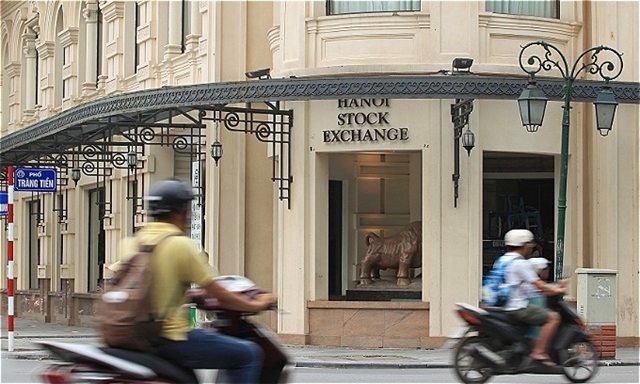 Economy
Economy


|
| The current Ha Noi Stock Exchange. The post-merger stock exchange, Việt Nam Stock Exchange, was expected to be headquartered in Hà Nội under the ownership of the Ministry of Finance. — Photo tinnhanhchungkhoan.vn |
HÀ NỘI — The two national stock exchanges will be merged into one single stock exchange and named the Việt Nam Stock Exchange. It will be headquartered in Hà Nội.
The information was released during the 36th session of the National Assembly (NA) Standing Committee held from August 12 to 16. It also beat previous predictions that the two current bourses will operate independently under the control and ownership of a new state-owned company.
The post-merger stock exchange will be managed by the Ministry of Finance, acting as a focal point for issuing regulations on stock listings and trading, monitoring the stock market, managing risk and directly organising securities transactions.
Vũ Hồng Thanh, chairman of the NA's Economic Committee said this plan ensured uniformity of the market, increasing transparency and greater efficiency in governance and ensuring legal rights of investors.
Poll results revealed that most of the reviewers believe that the initial plan, under which the nation’s two bourses in HCM City and Hà Nội will be merged into a new holding company model but still continue to operate independently, is improper and goes against the general global trend.
Agreeing with this plan, National Assembly Chairman Nguyễn Thị Kim Ngân said that there should be only one stock exchange.
“The new stock exchange does not have to be located in the capital but it must be located in the place where there is the most vibrant and active market,” Ngân said.
“There will be one main stock exchange and two trading floors, the location of the main exchange is up to the Government,” Minister of Finance Đinh Tiến Dũng said.
“The Prime Minister will decide the organisation, dissolution and conversion of ownership but we think that the State holding in the combined exchange does not have to be regulated as over 50 per cent but should be dependent on the economic conditions of each period of time. For example in Japan, the state does not hold a controlling stake,” Minister Dũng said.
Answering Minister Dũng, National Assembly Vice Chairman Phùng Quốc Hiển said there might be a time when the state might not necessarily hold a controlling stake, but at present in Việt Nam, the State still needed to maintain a major holding.
“This should be carefully considered as it could lead to an unstable financial market if the State does not play a leading role in the context that firms’ capitalisation are becoming larger,” Hiển said. — VNS




